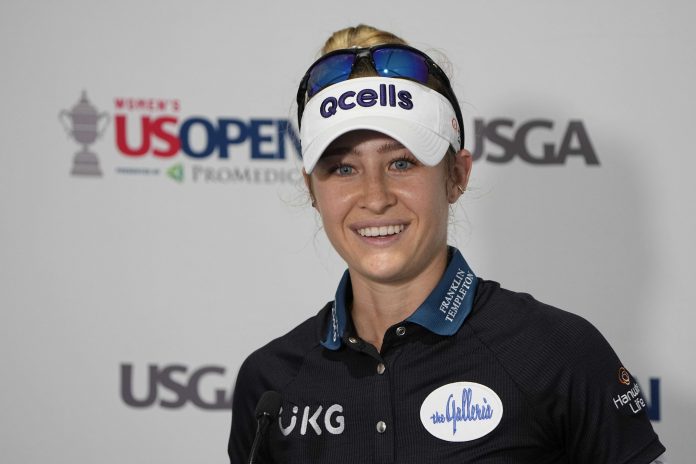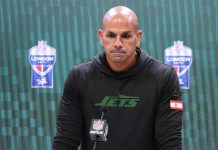
By DOUG FERGUSON
AP Golf Writer
Nelly Korda has a coach who knows all about top golfers returning from an injury, how patience and belief can be just as critical as any physical therapy. Among the messages Jamie Mulligan offered the 23-year-old Korda is that no one ever returned from an injury too late, even if that means starting on the biggest stage in women’s golf.
“I didn’t want my first event back being the U.S. Women’s Open,” Korda said with a smile after playing nine holes at Pine Needles. “I was just more thinking like I want to be 100%, and that’s all I was thinking. And then when I was 100%, I was going to set my eyes on what event I could come back at.”
Korda hasn’t played since Feb. 5, when she wrapped up a three-week start to the LPGA season in Florida with a tie for 15th. About a month later, she was gearing up for the California swing that included the first major of the year when she felt swelling in her left arm.
Turns out it was a blood clot in the subclavian vein, and she had surgery in April. The rehab was in California so she could be close to Mulligan, the CEO of Virginia Country Club in Long Beach.
Mulligan, honored in January as the PGA Teacher & Coach of the Year, has been running Virginia for 22 years and has a long list of pupils.
One was John Cook, who had to stop midway through the 1989 season because of a broken hand. He rose to No. 3 on the PGA Tour money list a few years later. More recently was Patrick Cantlay, whose back injury was so severe it kept him out for the better part of three years.
To see Korda deliver such an athletic, graceful swing is to be easily impressed. What also caught Mulligan’s attention was how she handled an injury that kept her away for longer than Korda would have wanted.
She was coming off the best year in women’s golf — four LPGA titles, her first major at the Women’s PGA Championship, a rise to No. 1 in the world and an Olympic gold medal in Tokyo.
And then she started 2022 with COVID-19, followed by a blood clot two months later.
“She understood the big picture,” Mulligan said Tuesday at Pine Needles in a brief chat after working with big sister Jessica Korda before meeting Nelly on the range. “She understood she needed to take the right steps. You can’t come back too late. She used her full capacity to train in order to mend the right way, to keep her composure and be comfortable with it.”
There was one other message from Mulligan related to the belief.
“Even when you’re sitting there, nothing is going to happen with your golf,” he said. “It’s been fun to watch her prepare.”
In some respects, the U.S. Women’s Open last year at Olympic Club is where it all began for Korda. She missed the cut and then began a run that took over the LPGA Tour.
Korda won the Meijer LPGA Classic in Michigan, came down to Atlanta and won the KPMG Women’s PGA to reach No. 1 in the world, and then a month later was posing on the top podium with an Olympic gold medal draped around her neck.
The No. 1 ranking didn’t last long at the start of this year and now belongs to Jin Young Ko, who beat out Korda for the Race to CME Globe title in the final event last year.
The U.S. Women’s Open has no shortage of compelling angles this year at Pine Needles. The prize money of $10 million is the richest in women’s golf. Michelle Wie West is back in the area where she won her only major at Pinehurst No. 2. Annika Sorenstam is playing at age 51, eligible from winning the U.S. Senior Women’s Open.
The LPGA Tour is showing balance again with 13 winners in 13 events. Korda feels as though she’s starting from scratch, and it can feel like a sprint — the Women’s Open, then a title defense in Michigan and the Women’s PGA.
But at least she’s starting, even if the expectations are minimal.
“To tee up and to hit my first shot on Thursday. That is as far as I’m looking right now,” she said. “I’ve been out of competition since early February, and I’m honestly just grateful to be out here. I’m going to take it one step at a time. I’m not expecting too much.
“Honestly, I’m trying not to think about it too much, and I’m just more grateful that I’m out here, I’m being able to compete, and I’m seeing all the girls, too.”
Mulligan would be the first to tell her it was worth the wait.



















